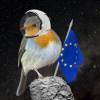A defense council meeting held at the Elysée Palace examined the possibility of Kiev joining the Atlantic Alliance, which had so far been ruled out by Paris, Berlin and Washington, but was supported by Central European countries such as Poland and the Baltic states. This French overture would be designed to increase pressure on Russia, at a time when the Ukrainian counter-offensive is encountering difficulties.
Defending the prospect of Ukrainian membership of the Atlantic Alliance (NATO) to influence the conflict and try to bring Moscow and Kiev to the negotiating table. This is the approach now favored by France in the delicate discussions between Ukraine’s allies in the run-up to the annual NATO summit, scheduled for Vilnius, the capital of Lithuania, on July 11 and 12.
According to our information, a recent Defense Council meeting at the Elysée Palace on June 12 examined the possibility of Ukraine joining NATO, an option now seen in Paris as a security guarantee in its own right, since it could discourage Russia from continuing the war or, should the conflict come to an end, prevent further aggression. Holding out this prospect could, in fact, convince Ukrainian President Volodymyr Zelensky to enter into negotiations, when he deems the time is right, depending on the results of the counter-offensive.
Tactical though it may be, this overture represents a real conversion for France. In so doing, Paris is moving closer to the positions defended by Central European countries, most of which, first and foremost Poland and the Baltic States, are relentless advocates of Ukraine’s accession to NATO. “The French position is now closer to that of Poland than to that of Germany,” confirms a foreign diplomat.
In 2008, at the Bucharest summit, French President Nicolas Sarkozy and German Chancellor Angela Merkel blocked any prospect of Ukraine’s rapid accession to NATO, against the advice of the United States, which at the time advocated its integration. In the minds of the two European leaders, this was a way of appeasing Russia.
Offering "security guarantees
Emmanuel Macron held to this line for a long time, both before and after the start of the Russian invasion in February 2022: “Ukraine’s entry into NATO would be perceived by Russia as something confrontational. You can’t imagine it with that kind of Russia,” he told Le Monde in December 2022.


